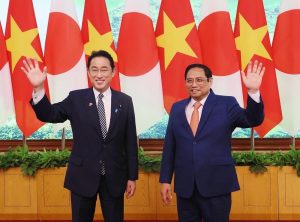The Russia-Ukraine war and Chinese maritime assertiveness have topped the agenda on the first two stops on Japanese Prime Minister Kishida Fumio’s three-nation tour of Southeast Asia. The trip, which will also take Kishida to Italy and the United Kingdom, kicked off Friday with a stop in Indonesia, where Kishida held talks with Indonesian President Joko “Jokowi” Widodo and the two leaders called for a rapid halt to fighting in Ukraine.
“The Ukraine war must be stopped immediately and we agree to create a conducive situation so that negotiations and a peaceful solution can be reached quickly,” Jokowi said during a joint news conference after the meeting in Jakarta, the Associated Press reported.
Russia’s invasion of Ukraine “shook the foundations of the international order, including in Asia, and it must be strongly condemned,” Kishida said, drawing a direct line between the Russian aggression and China’s decade of assertiveness in the East and South China seas.
“We are facing many challenges, including the situations in Ukraine, the East and South China seas, and North Korea, and maintaining and strengthening the rules-based, free, and open international order has become more important,” Kishida said, adding that the two nations should oppose any “attempts to unilaterally change the status quo.”
The two leaders also said that they would work together to improve humanitarian conditions in the country following the war, which has displaced millions since Russia’s invasion on February 24.
During the press conference, Jokowi confirmed earlier reports that he had extended an invitation for Ukrainian President Volodymyr Zelenskyy to attend this year’s G20 summit in Bali. The Russian invasion has thrown Indonesia’s presidency of the economic grouping into disarray, with European and North American members of the G20 threatening to boycott the proceedings if Russian President Vladimir Putin attends, derailing the Indonesian agenda of economic recovery from the COVID-19 pandemic. Jokowi promised that Indonesia would use its year at the helm of the G20 “as a catalyst for a humanitarian response and world economic recovery.”
He added that he had rejected a request from Zelenskyy for weapons from Indonesia, saying that this was prohibited under Indonesia’s constitution and its “free and active” foreign policy doctrine. But he said that the country was “ready to provide humanitarian aid to Ukraine.”
A similar agenda dominated Kishida’s meetings in Vietnam, where the Japanese leader met with senior leaders, including Prime Minister Pham Minh Chinh and Vietnamese Communist Party chief Nguyen Phu Trong, yesterday. The statements that came out of the meeting were more muted on the question of Ukraine, perhaps unsurprisingly given Vietnam’s reluctance to openly condemn Russia, a longstanding partner and a key source of arms imports.
According to the AP, the two nations agreed on the respect for international law and rejection of the use of force. As Kishida put it, “We cannot accept the actions to change status quo by force in any region of the world.” While Vietnam’s references to the Russian invasion remain limited and couched in generalities, the government announced after Kishida’s departure that it would provide around $500,000 in humanitarian aid to Ukraine.
Kishida’s securing of this commitment reflects the healthy broader state of relations between Tokyo and Hanoi, which have blossomed over the past 15 years in the context of China’s rising maritime assertiveness. During their meeting yesterday, the two leaders agreed to boost economic and security ties, with Chinh referencing “specific directions and measures to take their strategic cooperation relationship to a new level.”
The Japanese leader added, “We’ll strengthen bilateral ties in order to put the economies of both nations back on a clear recovery path in the wake of the coronavirus.” A former general secretary of the Japan-Vietnam Friendship Parliamentary Union, Kishida went so far as to say that he “has a predestined relationship with Vietnam.”
Kishida’s swing through Southeast Asia, which will come to an end today with a stop in Thailand, the host of this year’s APEC Summit, marks a bright start to his administration’s engagement with Southeast Asia. It comes after last month’s visit to Cambodia, this year’s chair of the Association of Southeast Asian Nations (ASEAN), where the two leaders issued similar condemnations of the Russian invasion of Ukraine.
The tour highlights the extent to which Japan remains an important partner for many Southeast Asian governments, with which it shares overlapping concerns about China’s growing power but are leery of the securitized approach of Japan’s longstanding ally, the United States. The Japanese government’s advantages in Southeast Asia lie in the fact that it offers a lot of what the region wants – mutually beneficial economic engagement, fair and transparent infrastructure financing, and a security counterweight to China’s growing clout – minus the perceived judgmental nature of U.S. and Western engagement, particularly on questions of democratic development and human rights.
Even though Japan supported the U.S. invasion of Iraq, it is generally able to speak of the “rules-based order” with more credibility than the U.S. and certain NATO member states, which have frequently violated international law when it has been in their perceived interests to do so.
As a result of these advantages, Le Huong Thu wrote in an article for Washington’s Center for Strategic and International Studies last month that Japan stands perhaps the best chance of nudging cautious Southeast Asian nations – none of whom, aside from Singapore, have joined the international sanctions campaign against Russia – into a more active position on the Ukraine war. “Tokyo’s active and skillful diplomacy may not guarantee that it can sway Jakarta, Bangkok, Phnom Penh, or anyone else,” she wrote, “but it stands the best chance to engage more constructively.”

































